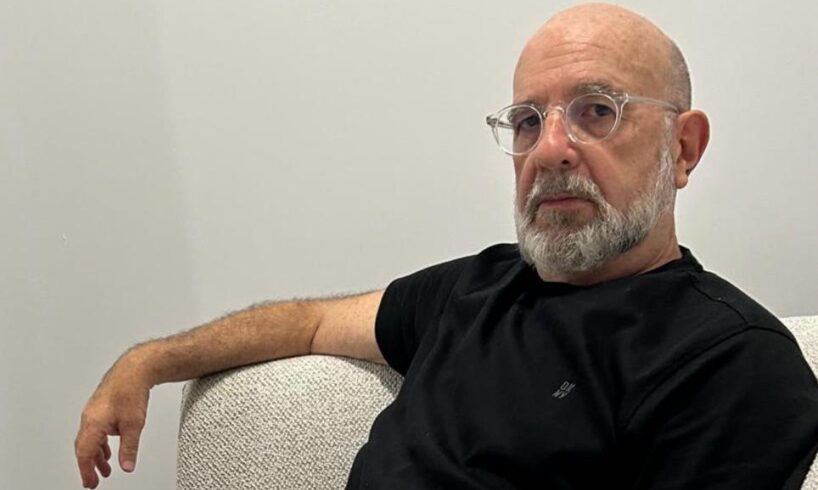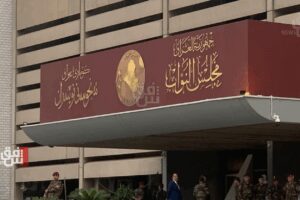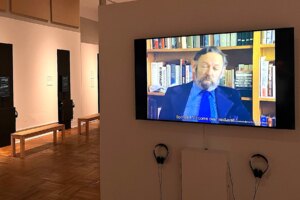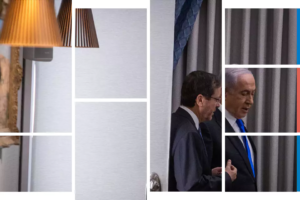
Like many Israelis at home and around the world, David Senesh was glued to the news as he followed the release of the last 20 living hostages in Gaza.
Yet, for Senesh, the scenes of expectation, joy, and emotional reunions between parents and children, siblings, and spouses resonated differently than for most people.
Some 52 years ago, Senesh himself returned to Israel after weeks of horrific captivity in Egypt, after being taken prisoner as a soldier during the 1973 Yom Kippur War. Three decades earlier, his aunt, iconic Zionist poet Hannah Senesh, was herself captured, and later executed after months of torture in a Nazi jail in Hungary.
“There was a deep sense of disbelief that something like October 7 could have happened at all; similarly, it was as hard to imagine that the release of the hostages would happen in the end,” he told The Times of Israel. “Now that they are out, we all can breathe again.”
On October 13, when the hostages were released after 738 days, Senesh, a clinical psychologist with an expertise in intergenerational trauma, was in Germany, where he and his wife have been spending most of their time for the past two years.
Get The Times of Israel’s Daily Edition
by email and never miss our top stories
By signing up, you agree to the terms
Speaking with The Times of Israel in two video interviews over the course of the summer and then again briefly via WhatsApp last week, the former POW shared his personal story and perspective on what may await the former captives as they reintegrate in the years ahead.
He also expressed his deep concerns over the direction the country has taken, even from before the October 7, 2023, Hamas atrocities, warning Israeli society against acting as a “justified victim.”
David Senesh (third from the left), a clinical psychologist specialized in intergenerational trauma, a former Yom Kippur War prisoner of war and the nephew of Zionist poet Hannah Senesh, on the day he returned from captivity in Egypt in November 1973. (Courtesy)
From early childhood, being Hannah Senesh’s nephew shaped the way people interacted with young David, though he never met his famous aunt.
“I could see that people looked at me differently,” Senesh said. “I was 5 years old and they were already projecting something on me. It made life more interesting, but in a way, also more tragic, because you always live in the shadow and the light of somebody else.”
Born in Budapest, Hannah Senesh moved to Mandate Palestine as a teen in 1939 to join kibbutz Sdot Yam. Though deeply in love with the land of Israel, she enlisted in the British Women’s Auxiliary Air Force and returned to Europe as a paratrooper on a doomed mission aimed at helping the Jews suffering the Holocaust.
Today, she is remembered for both her heroism and writings, including moving poetry and a farewell letter to her brother Giora, David Senesh’s father, who immigrated to Palestine just weeks before she embarked on her final mission.
The psychologist described his aunt and his family as “truly Zionist.”
“After World War II, [Zionism] made sense, as it was very dangerous to be a Jew anywhere else,” he said. “They were refugees and survivors.”
Senesh is critical, though, of the limitations of the Zionist project when it comes to how it relates to Palestinians, though he does not fault early Zionists for failing to understand or address the Arab population that was living in the Land of Israel when they arrived.
“I can relate to the diaries of my aunt,” he said. “She could not see all the problematic realities of Palestine. She has no observation on the Arab population.”
Hannah Senesh and her brother Giora, right, in 1924, part of the Hannah Senesh archives at the National Library of Israel. (Courtesy National Library of Israel)
Suez Canal, 1973
David Senesh was drafted into the IDF’s armored corps in 1972. A few months before the war broke out with a surprise attack against Israel by Egypt and Syria on October 6, 1973, he was posted in a small hold on the Suez Canal.
Senesh said he and his fellow soldiers saw that something “was happening” ahead of the attack that caught Israel unprepared on the holiest day of the Jewish year.
“We were there for three months, we saw everything that was happening, but the army and the political system were completely blind,” he noted.
Senesh and other soldiers were captured after days of intensive fighting.
“We were taken to a prison in Egypt,” he said. “Because we were soldiers, we went through interrogations, and they tortured us in order to get the little information that we had.”
Israeli paratroopers march along the Suez-Cairo road after crossing the Suez Canal, October 1973. (Ron Ilan/GPO)
His Egyptian tormentors would tell him that they were being treated in the same way as the Israelis would treat Arab prisoners.
“I thought they were kind of brainwashing me, but afterward, I learned that in this respect, Israel is no better than the Arab countries,” said Senesh, who also serves as an expert for the nonprofit Public Committee Against Torture in Israel (PCATI).
Over the years, Israeli and international rights groups have often denounced instances of torture or abuse of Palestinian detainees at the hands of the security forces, such as the Shin Bet and the Prison Services, which, for the most part, reject the accusations and maintain that they operate according to Israeli law.
Senesh and the rest of the Israeli prisoners in Egypt, some 240 people, were returned in an exchange with thousands of Egyptian soldiers on November 15, 1973.
“My family thought that I was killed,” Senesh said. “They found out I was on the list [of prisoners to be released] only two days before our return.”
Senesh was given a few days to spend at home and was then sent back to the military.
“Most of us were moved to non-combat units,” he said. “I had another two years to complete my regular army service, and then I stayed on an additional year as an officer.”
Israeli prisoners of war attend a meeting on a military base in Zichron Yaakov on November 26, 1973. (Ron Ilan/Israel Defense Forces/Defense Archive)
At the time, Senesh considered returning to the army a normal step — even a positive one.
“It took years before I would question things about myself and about the world,” he said. “Paradoxically, it was with the peace accord with Egypt [in 1979] that I understood that it was all a political game, that you can fight at one point, and then you make peace years afterward, and we were just used to achieve different political purposes.”
Senesh said that these thoughts started to “get to my head.”
Whose trauma?
Once he completed his army service, Senesh decided to study psychology, and after his first degree at the Hebrew University of Jerusalem, he was presented with an opportunity to continue his studies in Canada and then the United States. He relished the chance to get away.
“I needed a break,” he said.
Deeply affected by his own experiences, Senesh decided that he could not work with other former hostages or POWs. Instead, he focused on victims of child abuse from violent families.
“You could even say that some children are hostages in the conflict between their father and mother, and sometimes their situation is even worse than what I have been through, because they are so young,” he noted. “So even if you decide not to, you still work with your own trauma.”
Hannah Senesh with chickens on Moshav Nahalal, part of the Hannah Senesh Collection that is now part of Israel’s National Library (Courtesy National Library of Israel)
After years away, Senesh and his wife felt they were ready to return to Israel.
“We spent a decade abroad, but we felt that life in North America was not appealing to us. It was easy and pleasant, but we had two children, and we wanted to give them a proper Jewish education,” he said.
By 1990, Senesh and his family were back. For the following decades, they mostly lived in Israel, spending occasional periods abroad.
Over time, his experiences in captivity and what he described as Israel’s “never-ending cycle of violence” increasingly weighed on him, transforming the way he looked at the country and the world.
“Israel just moves from one crisis to another, from one trauma to another, without processing what it has been through,” Senesh said.
He and his wife were visiting Berlin, where their son had just moved, on October 7, 2023. While some Israelis abroad were spurred by the unprecedented attack to move back to Israel, Senesh and his wife had the opposite reaction, deciding at that moment that they should spend most of their time abroad with their children, including their US-based daughter, only returning to Israel for short periods every couple of months.
People visit the site where revellers were killed and kidnapped on Oct. 7, 2023, cross-border attack by Hamas at the Nova music festival near Kibbutz Reim, southern Israel, Monday, Oct. 6, 2025. (AP Photo/Leo Correa)
Describing his feelings about Israel, Senesh often switched between the personal and the collective.
“We have felt a growing concern about what has been happening in Israel, not just militarily or economically, not just in terms of what people are doing to us, but what we are doing to others, which is more interesting, because we have more control over that,” he said.
“When you are a prisoner of war, you are powerless, but what do you do with power?” he added. “Are you turning the same abuse towards other people, or are you going through a restorative process to come to terms with the other people and create a different reality?”
Senesh blamed Israeli leaders and society for not choosing a different path.
“Politically, I see that the problem is mainly with the Palestinians, and controlling, occupying and subjecting a people to be oppressed and not have citizenship,” he said. “That’s unbearable for 50 years.”
“This is a major threat to [the country’s] integrity,” Senesh said. “From my professional perspective, I believe that we are going to move from post-trauma to moral trauma, or a situation where people are traumatized by what they did to others, by the things they knew, or almost knew, were happening.”
A Palestinian man carries a box of food from the World Food Programme (WFP) after collecting it in Khan Younis, in the southern Gaza Strip, on October 20, 2025. (AP Photo/Jehad Alshrafi)
Senesh also warned Israelis against feeling like victims.
“Victims that take this role on themselves can become very dangerous,” he said. “There is nothing more dangerous than a justified victim, because if it was done to me, I have the right to do it to you, and being caught in this situation again and again.”
A tale of two captivities
Senesh stressed that his experience as a captive and that of the hostages in Gaza could not be exactly equated.
“I was not a hostage, I was a prisoner of war,” he said. “There are both similarities and differences.”
According to Senesh, the isolation, torture and abuse directly perpetrated on captives create a sense of betrayal towards those who failed to protect them — a feeling that is likely even deeper for the October 7 hostages, as they were taken from their civilian lives and not from the battlefield.
“When the enemy is sadistically torturing you, it is a betrayal of relationships,” he said. “When you’re coming out of this experience, you’re in deep existential crisis.”
Released hostages Gali and Ziv Berman greet ecstatic crowds welcoming them to Kibbutz Beit Guvrin on October 19, 2025 (Tanya Zion-Waldoks/Israeli Pro-Democracy Protest Movement)
After surviving captivity, a question arises about how one sees the world again, Senesh said.
“When they are rescued, people have extreme feelings — of happiness, of relief,” he said. “They are reborn. But of course, there is also the loss and the grieving and the survivor’s guilt.”
He warned against the risk of “becoming heroes prematurely.”
“[The hostages] are going back to do things; they want to go back to the army,” he noted. “They really are heroes, but the problem with trauma is that after a while, if it is not addressed properly, it becomes repressed. A person can live a normal life for years until something triggers it.”
Crowds near Hostages Square in Tel Aviv light up their phones during the singing of Hatikva, Israel’s national anthem, at the end of a rally urging the return of the bodies of slain hostages held in Gaza, October 18, 2025. (Gilad Furst / Pro-Democracy Protest Movement)
According to the psychologist, both the hostages and Israeli society must allow themselves the time and the process to heal, so that the country can really move forward to a better future.
“Their release marks the starting point for collective and personal rehabilitation that might take a long time,” he said. “Treatment and healing should attend all layers of society that were affected directly or vicariously by the vortex of trauma.”
“During the war, there was a clear split between us and them and good and bad, respectively,” he added. “In the next phase we will have to deal with more complex mental positions where we will have to deal with negative aspects of ourselves as a collective that were naturally projected on our adversaries. Without going through that phase, real change is not likely to take place.”





